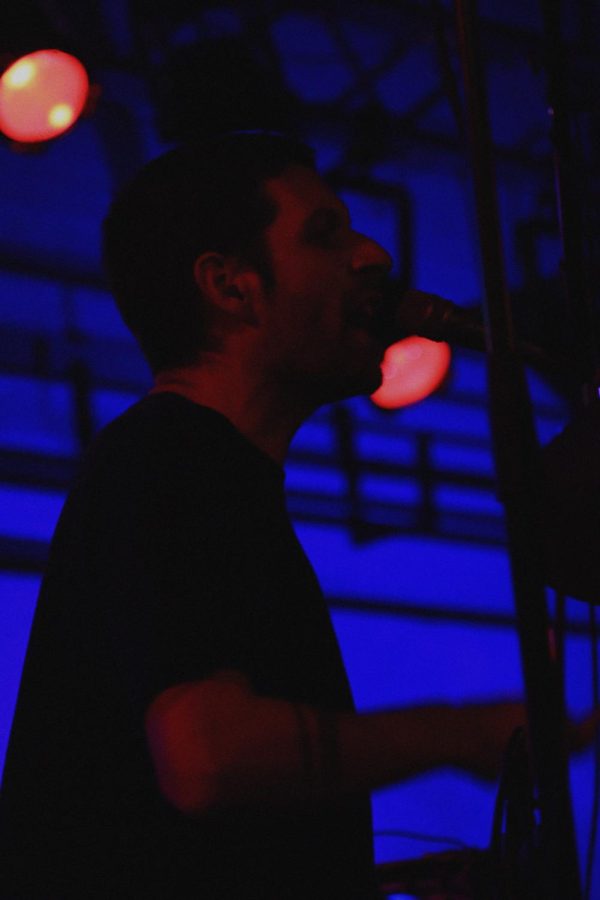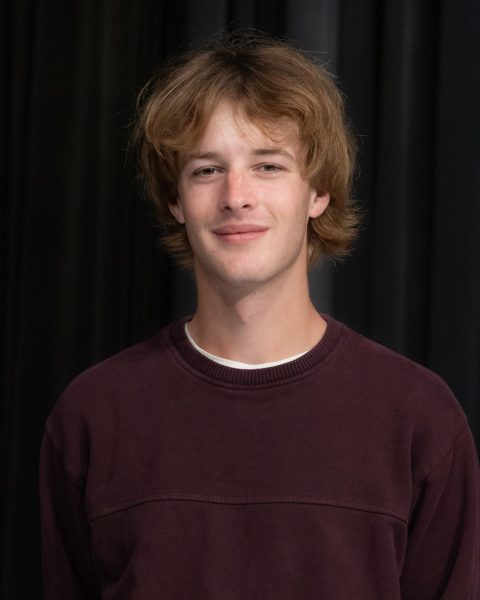Somewhere between ambient music, shoegaze, noise rock, and punk, lies No Age, LA juggernauts who are back after two years with a new album and a tour. Their new album out on Drag City, “People Helping People,” is a stellar collection of endlessly exciting tunes that represent the band’s ethos of always doing what they find interesting and not caring what others think.
The album takes listeners on a wild ride through ethereal ambience and scathing punk, creating an atmosphere that few other bands are able to achieve. The group perfects the art of retaining memorability and catchiness while taking wild leaps in production and experimentation.
I saw the band on Thursday, Oct. 13 at the Back Room at Colectivo. Before the show began I was able to interview guitarist Randy Randall and drummer/singer Dean Spunt.
Tom: It’s been two years, with there being a pandemic and all, what does it feel like getting out on tour again?
Dean: It’s still a little bit to be determined, with it only being our second show.
Tom: How did Madison go?
Dean: It was our first show since the pandemic, you know. We did other shows that were just kind of samples and guitars, sort of soundscape stuff, but this was the first kind of full-on No Age show, so there are a few kinks to work out, but overall, it was good.
Tom: So with the tour, you guys have a lot of acts you are playing with. Do you have anything to say about the acts you guys are playing with, or how selecting them went?
Dean: So there’s only two of us in the band, so we delegate responsibilities. Randy will pick hotels, I’ll usually pick the bands. A few of the bands are on the label I run, Post Present Medium, like DREAM_MEGA and Syko Friend are on the trip. Melt-Banana we played with years ago, and I saw them when I just graduated high school, so when it came that we were booking a tour at the same time as them I was really excited to play a couple shows with them. On the west coast we’re playing with Flaccid Mojo and John Wiese, who are old friends of ours, and some cool local bands. It’s cool to play with bands we like, we always try to do that.
Tom: So I’ve noticed with the new album, in comparison to previous ones, it focuses a lot more on ambience. What can people expect when they come to see a No Age show with the sets you guys are playing?
Dean: I think it leans heavier on [ambience] than past sets.
Randy: I think it represents the record; we play a lot of songs from the new record and so I think we definitely allow ourselves the indulgence of playing instrumental songs. There were always moments like that on the records, with one or two instrumental songs, but we were just having fun in the studio making stuff and it felt creatively exciting doing those sorts of things, so I think in the live set we can build on them a little bit. It’s definitely a mix.
Dean: And we’re splitting the difference a little bit. I think there’s times in previous tours or No Age shows where we’ll show up and do an all-instrumental set and the reaction is a bit like, “ugh,” so we’re kind of meeting in the middle with that.
Randy: It’s also like when we were younger, we’d want to play the punk songs because kids were here to see a loud show and do stage dives. On the record, there were always moments of sort of dreamy, soundscape-y things and we rarely did those live. So I think if you listen to the records and you like that dynamic, we barely did those years ago, so now it’s nice that we’ve matured a bit more and do that now.
Dean: But it’s reflected on the record, and our set is about 90% of the record now.
Tom: I notice while listening to “People Helping People” that there are a lot of different approaches and directions to the production on each song. Was that a conscious decision going into the record, or what was the process behind that like?
Randy: I think it was sort of reflected on where we were at, we recorded the whole record ourselves and didn’t go into a studio. I think when you go into a studio you are looking to capture a uniform sound across all songs.
Dean: You’re paying, too, and the engineer isn’t gonna move the mics around, it’s more like “let’s get the six drum songs in two hours.”
Randy: With this one, we did it ourselves and I engineered it, so we were free to sort of throw mics up and take them down and move them around. There’s one song, “Compact Flashes,” where we put one mic on the snare and the rack tom, and it creates this really kind-of direct snare sound with this roomy tom sound, and it was sort of my accident but when we heard it back, we really liked it, so it’s the kind of thing where an engineer would be like “you gotta do another take with a close mic on that” but since we were steering the ship, we were like, “we like that.” Those are the fun accidents that are fun to capture in a studio.
Dean: It goes song by song, too. Some of the songs were recorded in our old studio too, our old practice space, and we had to move out, so then we were in another space, Randy’s garage. But I don’t know if there was a sense of trying to be cohesive with the sound, because everyday we’d record something, we’d move shit around, so it sounds all different because we recorded like that.
Tom: With the general sound of No Age, over the years, I find that, although it’s an overused term, you “use the studio as an instrument.” Is that ever difficult to bring to a live setting?
Randy: Totally, a live setting is very different from a controlled studio environment, and we can only bring enough stuff that we can carry every night. There’s a song we just soundchecked with, “Slow Motion Shadow,” where on the record, it was really compressed. We recorded it, then threw it to a four track machine and slowed it down, so it has this really kind of lo-fi quality on the record, and when it came to playing it live, we were looking at a few options of how we represent it. I think we took a very straight approach the first time we took a whack at it and it was way too clean and it lost a lot of what made it interesting. So we kind of experimented a lot with how we do it live and landed at how we’ll play it tonight, and it feels good that the sound is different.
Dean: Live is one thing and recording is one thing. You don’t wanna translate it directly, because then what’s the point of seeing it live? It’s gonna be different, and that’s kind of exciting, I think.
Tom: No Age has always been you two, but have you guys ever toured with additional members, and what was that like?
Dean: For the “Everything in Between” record, we had two additional people tour with us.
Randy: For that record, I was using a lot of sampling live, like I’d record the guitar into the sampler and play it as a rhythm guitar, or another element, and so we felt like to present the songs on that record, we wanted to get somebody hitting the samples on time. After that tour and record, we sort of upped our sample game, and Dean has a sampler now that he plays and we have some foot loops we can trigger.
Tom: With keeping the same two members through such a long career, what has the maturation in music been like? For me, “People Helping People” sounds nothing like “Weirdo Rippers,” so what has it been like keeping the same two members for this long and switching it up?
Dean: I don’t feel like we’ve switched it up.
Randy: I think we’ve given ourselves the mission to be honest musically. That’s what we find creative areas the most interesting, where we can be doing what’s exciting us now and not have a sense of “what would I have played ten years ago?” We just play what we’re feeling excited with at the moment, and that’s been the guiding light for each release, they have their own intentions of representing us at where we’re at. It’s like a Venn diagram of what I’m interested in and what Dean’s interested in, and where they cross is sort of what No Age sounds like at the time. That’s sort of how we get to an evolved sound over time.
Dean: I think also, your opinion is more representative of what it actually is than ours, because we have this sort of built-up fantasy of what No Age is, in a way. What I think we’ve sounded like isn’t really what it’s sounded like. If you put on a track from “Weirdo Rippers” and then “People Helping People,” yeah, it sounds crazy different, with the vocals especially; they were really high-pitched singing versus more low singing now. But in our heads, and I imagine the same for you, we’ve been doing the same thing so it feels the same, although we were a lot younger and totally different. But there’s this whole imaginary world where it exists. We’re not really making big statements, the whole band consists of whatever we’re playing together and what we think is interesting, so the music is where we land on something we’re both interested in. We have totally different music tastes. We’re sort of evolving together, and it’s more of like a friendship on record than a band with a contract and a mission.
Randy: It couldn’t be a different drummer or anything, or guitarist.
Dean: We would break up. I couldn’t be No Age with some other guitar player.
Tom: So you guys say you have totally different music tastes. What different influences do you guys bring in, if you can pinpoint it?
Dean: I mean, I listen to reggae, like all day. And it’s been like that for f*ckin twenty years.
Randy: And I listen to, like, Neil Young.
Dean: But we grew up listening to a lot of punk. Now both us are kind of old and curmudgeonly, and I feel like as you get older, a lot of new music makes you say “ehhhhhh.” I feel like we maybe listen to a lot of older stuff, like right now for me it’s a lot of reggae and jazz, and I listen to a lot of stuff on my label, and I hear new music a lot, but what I tend to put on is various forms of Jamaican music.
Randy: Yeah, and I’ll put on a Bob Dylan record, or a Nick Lowe record, or something.
Tom: I have two short lame questions after this, but to sort of wrap it up, what do you think the overall ethos of “People Helping People” is?
Dean: Oooooh. I think it represents, if it represents anything, it feels unique in a way that we have come to a place where we feel confident to just strip any sort of illusion of what No Age is. It’s like we can present ourselves as we wish without feeling like we have to do anything; we don’t have to go with an engineer or have to lean more towards rock songs because we feel like people might want to hear that. At this point, we feel like we can do whatever, and the people that are here don’t have to appreciate that, and if you don’t want to appreciate it, then you don’t have to hear it. While recording it, we did end up adding a few more rockin’ songs on there, when it was mostly ethereal, instrumental stuff; it felt a little one-sided, but at this point, if you don’t like it, who gives a sh*t? It feels honest. That’s the ethos. Honesty. If there is something.
Randy: It’s a rare position for musicians to be in a place where we’ve put out this many records, at most points bands break up or do something else this many records in, so I feel very confident where if you like those [past] records, you can listen to those records, but I don’t have to rerecord those records for you. So I feel very confident in that this is a great body of work that we’ve put out and I can stand behind all of that, but the key that that sort of unlocked for us this time around is “go be who you want to be,” versus feeling this burden of “I’ve put out all these records and I’ve gotta sound like that” and having this boring, sort of repetitive experiment. It was more interesting to feel like those records are great, and you can hear them in perpetuity, and this is a new thing we want to add to that body of work. We like to see where bands go over time, and I think “where would that band sound like fifteen or twenty years in?” And we get to answer that question for ourselves, like “what would No Age sound like in 2022?”
Tom: Now, the two lame questions. One, are you guys still vegans?
Randy: Yes.
Dean: Yes.
Tom: Two, where did the name No Age come from? I don’t actually know this.
Dean: No Age was a comp album that came out I think in ‘87 on SST, and it was an instrumental compilation of experimental music. And a lot of it was… okay.
Randy: Like Lee Ranaldo has a solo track, so it’s that kind of stuff, like in ‘87!
Dean: But the name was good, and the artwork, and I liked that the label was confident enough to say “I don’t know, instrumental music from the label that also brought you Black Flag!” I like that, sort of fuck you! F*ckin with the punks.
Randy: The sort of punk ethos, but taking it in an experimental direction was directly on the nose of what we were sort of trying to accomplish.
Dean: And experimental was not cool, it was sort of like “here you go!”
Randy: So when we thought of what we wanted to do as a band, we wanted to be punk but experimental, so it was a great version of that that we could hitch ourselves to.
Dean: And it’s catchy. No Age. You get a good shirt out of it.
This story was written by Tom Oeffling. He can be reached at [email protected].




